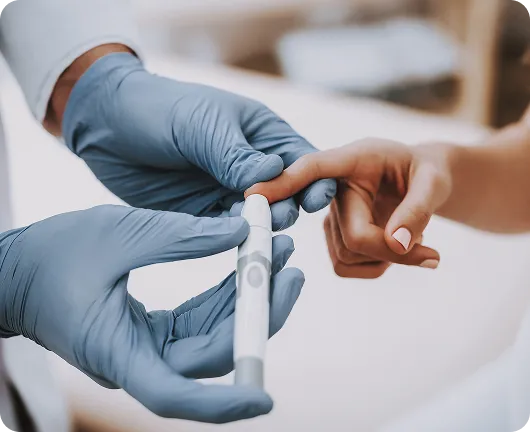Relief from Diabetic Neuropathy Starts Here
Minimally invasive treatments to reduce nerve pain and improve mobility

Understanding Diabetic Neuropathy and Its Impact
Diabetic neuropathy is a complication of type 1 and type 2 diabetes caused by prolonged high blood sugar levels, which can damage nerves and blood vessels. This condition often affects the sensory and motor nerves, especially in the legs and feet, leading to reduced mobility, changes in sensitivity, and coordination issues.
In more advanced cases, diabetic neuropathy can also affect other areas of the body, causing muscle weakness, digestive problems, and changes in blood pressure. If you have diabetes and notice numbness, tingling, or reduced movement in your lower limbs, seeking professional care early is key to avoiding further complications.
Understanding Diabetic Neuropathy and Its Impact
Diabetic neuropathy is a complication of type 1 and type 2 diabetes caused by prolonged high blood sugar levels, which can damage nerves and blood vessels. This condition often affects the sensory and motor nerves, especially in the legs and feet, leading to reduced mobility, changes in sensitivity, and coordination issues.
In more advanced cases, diabetic neuropathy can also affect other areas of the body, causing muscle weakness, digestive problems, and changes in blood pressure. If you have diabetes and notice numbness, tingling, or reduced movement in your lower limbs, seeking professional care early is key to avoiding further complications.

Causes of Diabetic Neuropathy
Although elevated blood sugar levels usually cause diabetic neuropathy, other factors may contribute to its development. These include:
Hyperglycemia
Elevated glucose in the blood vessels could lead to reduced oxygenation in the circulatory system and nerve damage.
Inflammation
Inflammation in the arteries could lead to nerve disruption.
Metabolism
Abnormalities in the metabolic system can contribute to nerve and blood vessel damage.
Genetics
A medical history of nerve and blood vessel issues can lead to the development of diabetic neuropathy.
Lifestyle
Having poor dietary habits and not exercising could lead to diabetes.
Symptoms of Diabetic Neuropathy
Visiting your doctor for evaluation is recommended if you identify any of the following symptoms of diabetic neuropathy:
✔ Numbness or tingling in the hands, legs, and feet
✔ Loss of skin sensitivity and reduced ability to perceive heat or cold
✔ Constant pain in the limbs Muscle weakness
✔ Coordination issues
✔ Digestive issues like nausea, vomiting, and diarrhea
Diagnosis of Diabetic Neuropathy
If you have a family history of diabetes or have symptoms of diabetic neuropathy, it is ideal to seek a professional diagnosis. During diagnosis, your doctor may perform the following actions:
Evaluate the medical history of your family to discard any potential hereditary factors that could contribute to the development of diabetic neuropathy.
Carry out a physical examination of your legs, arms, and feet to test your sensitivity, muscle strength, and mobility range.
Order blood tests to assess your glucose levels.
Request an electromyography to measure the electrical activity of muscles and nerve cells.
Treatment Options for Diabetic Neuropathy
Treatment for diabetic neuropathy often focuses on reducing blood glucose levels and pain in the feet, legs, and arms. These may range from the following options:
Non-Opioid Medications
These medications help manage pain without the risk of addiction. Often recommended options include antidepressants and anticonvulsants for localized nerve pain.
Neuromodulation
Neuromodulation therapies aim to restore nerve function and reduce discomfort. One example is Transcutaneous Electrical Nerve Stimulation (TENS), which uses low-level electrical impulses to reduce pain and improve circulation in affected limbs.
Therapies & Lifestyle Changes
In combination with medical treatment, lifestyle changes can significantly improve outcomes. These include:
✔ Proper foot care and hygiene to prevent injuries and infections
✔ Maintaining a low-sugar, balanced diet
✔ Regular physical activity focused on the legs, feet, and arms
✔ Taking vitamin supplements, if recommended
✔ Avoiding smoking and excessive alcohol consumption

Care That’s Close to Home
We offer care from two convenient clinic locations, making it easy to access expert medical support close to home.
Each facility is designed to provide a welcoming, safe, and efficient environment equipped with advanced technology and supported by a compassionate team dedicated to your well being.
Care That’s Close to Home
We offer care from two convenient clinic locations, making it easy to access expert medical support close to home.
Each facility is designed to provide a welcoming, safe, and efficient environment equipped with advanced technology and supported by a compassionate team dedicated to your well being.

Why Choose Spinal Diagnostics?
Patients choose Spinal Diagnostics for our comprehensive approach, accurate diagnostics, and compassionate care. We stay at the forefront of interventional procedures and are committed to improving your quality of life—without opioids or invasive surgeries.
Proven Medical Expertise
We bring years of clinical experience in pain management and interventional procedures.
Constant Innovation
We use the latest techniques and technology to ensure safe, effective treatment.
Compassionate Care
We listen, understand, and treat every patient with empathy and respect.
Personalized Plans
Each treatment is tailored to your condition, goals, and lifestyle.
Explore the treatments that bring real relief.
Learn how our non-invasive solutions and personalized plans can help you feel better, faster.
Explore the treatments that bring real relief.
Learn how our non-invasive solutions and personalized plans can help you feel better, faster.

